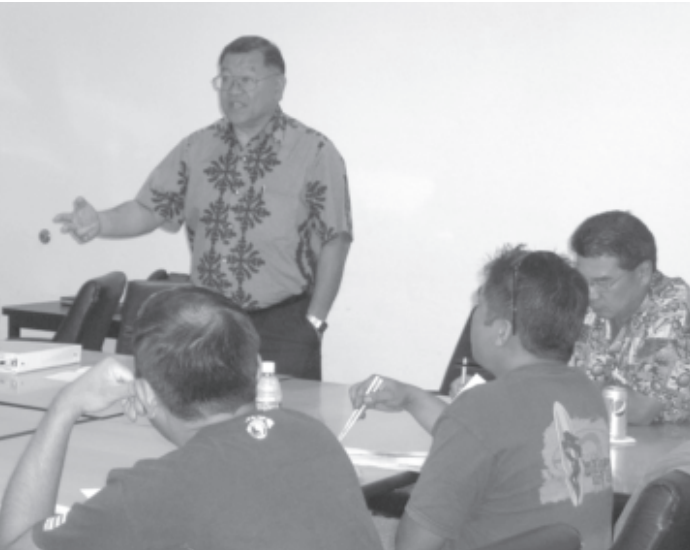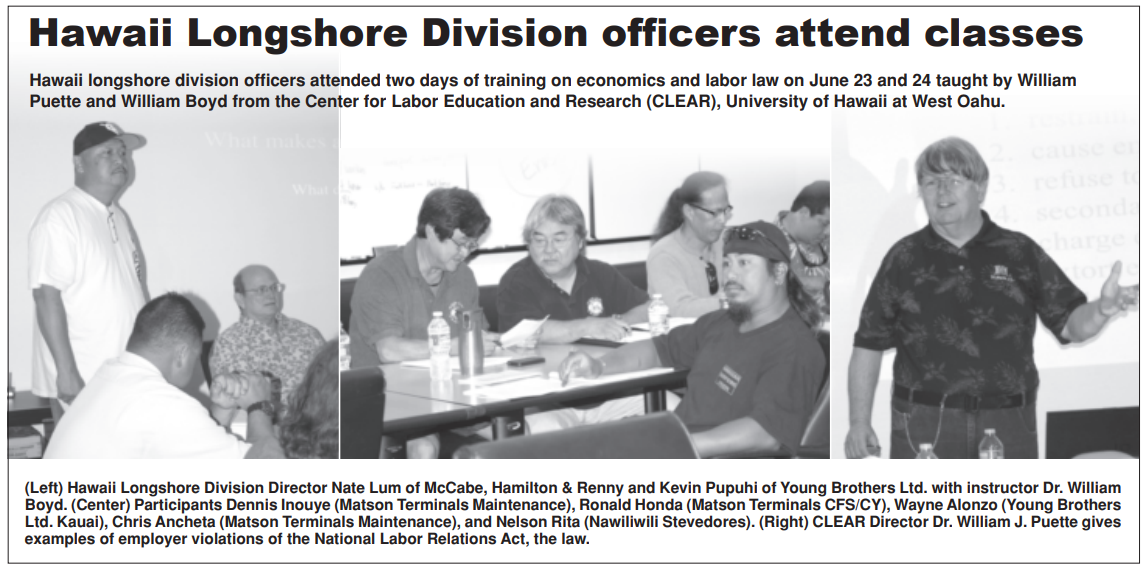The Oahu Division Executive Board (DEB) meeting on April 29, 2011 featured State of Hawaii Department of Labor and Industrial Relations Director Dwight Takamine.
Under Republican Governor Linda Lingle, private profit and private business came first. The Department of Labor and Industrial Relations lost 61 positions, programs were underfunded, and enforcement was lax. Pro-business people were put in charge of key programs and workers rights became secondary.
Hawaii once had one of the best workplace safety and health programs in the nation, but budget cuts and the layoffs of workers under Governor Lingle crippled the program. States may run their own job safety programs but must meet minimum federal standards. At one point it was so bad that the Federal Government was about to step in to take over the safety program.
Dwight Takamine is working to rebuild the safety program. He has restored 12 positions and brought back some of the more experienced administrators to manage key departments.
There are about 560 employees in the Department of Labor who operate 12 programs that serve some of the needs of working people in Hawaii. About 200 employees handle the unemployment insurance division; 100 employees do workforce retraining. Other programs include workers’ compensation when workers are injured on the job; the Hawaii Civil Rights Commission which
protects workers from illegal discrimination on the job; and the Hawaii Institute for Occupational Safety and Health.
Changing laws and administrative rules to help workers
Some improvements can be made by changing the law or reworking administrative rules. Dwight worked closely with the ILWU to remove an unfair provision of the law that applied to partial unemployment benefits.
Many hotels upgrade their properties and temporarily close during the renovation work. Sugar companies shutdown every year to do major maintenance work on their mills. Their workers may be laid off for several weeks or months, and they are entitled to collect partial unemployment during this period. Because they are still attached to their employer, they are not required to seek other employment every week. They are allowed to work part-time, but their unemployment benefits may be offset by their earnings from their part-time job.
In one case on Kauai, an ILWU member was collecting partial unemployment because her hotel was closed for renovation. She got parttime work at another hotel and her unemployment benefits were reduced by her part-time earnings. The second hotel wanted to change the member’s work location, so she decided to quit the job. Unfortunately, the unemployment office ruled that this disqualified the member from receiving any further unemployment benefits. The ILWU appealed the case, but lost because of the wording of the law where workers may be denied benefits if they quit or decline a job offer.

Director Dwight Takamine (standing) explains how he is rebuilding the State Department of Labor and Industrial Relations to better serve the needs of workers.Dwight,aformerstaterepresentativeandstatesenator,wasappointed byGovernorNeilAbercrombietoheadthedepartment.TheOahuDEBregularly invites guest speakers or holds a short training session for attendees. Hawaii Civil Rights Commission Executive Director Bill Hoshijo and Pride at Work Hawaii spoke at the May 27 DEB meeting, and Tom Cestare, Officer in Charge of the National Labor Relations Board’s Subregional office, spoke at the June 24 DEB. August’s DEB will feature a class on work opportunity.
The union worked closely with Senator Clayton Hee, Dwight Takamine and labor department administrators to pass a law which makes it clear that partial unemployment benefits from a primary employer would not be affected if a worker, for good cause, quits or is fired by a secondary employer.


